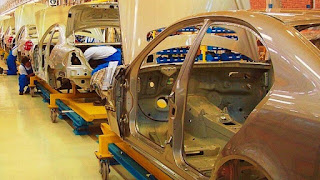Tesla's success has inspired a legion of startups to produce electric vehicles, the assumption being that a growing market can absorb a host of new products.
But it turns out that designing a vehicle and selling its virtues to investors is a lot easier than actually making the darned things. JL
Ioanna Lykiardopoulou reports in The Next Web:
Startups such as Rivian, Lucid Motors, and Arrival have made their debuts with impressive EVs, but they’re facing a very practical problem: actually making them. The openness of the EV space, the lower barriers to entry, the ease of reverse takeovers (ROT), and Tesla’s success, all led investors to splash the cash on EV startups even in companies without profit, or a single vehicle shipment. 18 carmakers have listed in the past two years through a SPAC), or an IPO. A number of them are battling with production halts. Most of them have seen their stock valuation dropping, as they’re hit by global supply shortages.The auto industry’s shift to electric cars was bound to bring a flood of new entrants. Startups such as Rivian, Lucid Motors, and Arrival have made their debuts with impressive EVs, but they’re facing a very practical problem: actually making them.
In an intriguing piece, the Financial Times’ Peter Campbell details how nascent EV makers emerged and what risks they’re currently facing.
The openness of the EV space, the lower barriers to entry compared to the ICE market, the ease of reverse takeovers (ROT), and Tesla’s success, all led investors to splash the cash on EV startups — even in companies without profit, or even a single vehicle shipment.
According to data from PitchBook, at least 18 carmakers have listed in the past two years through a special purpose acquisition company (SPAC), or an initial public offering (IPO).
But will there be a return on investment?
The hope that one of the startups will be the next Tesla may be extreme optimism. Tesla itself had some dark hours before making it to the other (trillion-dollar) side, but its case is unique.
When it started nearly 20 years ago, the EV space was wide open, and the company could get away with delays and changed timeframes.
Now, the market is highly competitive, established automakers are increasing their EV output, and it’s unlikely that shareholders will show the same patience they did years ago.
In fact, new EV makers are already feeling the pressure.
A number of them — such as Rivian and Lucid — are battling with production halts. Others, like Canoo and Nikola, are facing or have faced federal investigations. And most of them have seen their stock valuation dropping, as they’re hit by global supply shortages.
To escape “manufacturing hell,” startups like Canoo and Polestar are focusing on establishing their own factories — with the latter already operating its plant in China.
Others, like Fisker, are turning to big brands for help in an attempt to outsource production.
In any case, the deciding factor in which companies will survive the manufacturing challenge may be money.
But even though some of them have secured a significant amount of cash (with Rivian at $1.9 billion and Lucid at $6.2 billion), not all startups have adequate capital at their disposal — Lordstown Motors has $244 million, while Canoo just $225 million.
And there’s a big remaining challenge: will they be able to secure adequate funds if they can’t show continuous progress and production results?



















0 comments:
Post a Comment